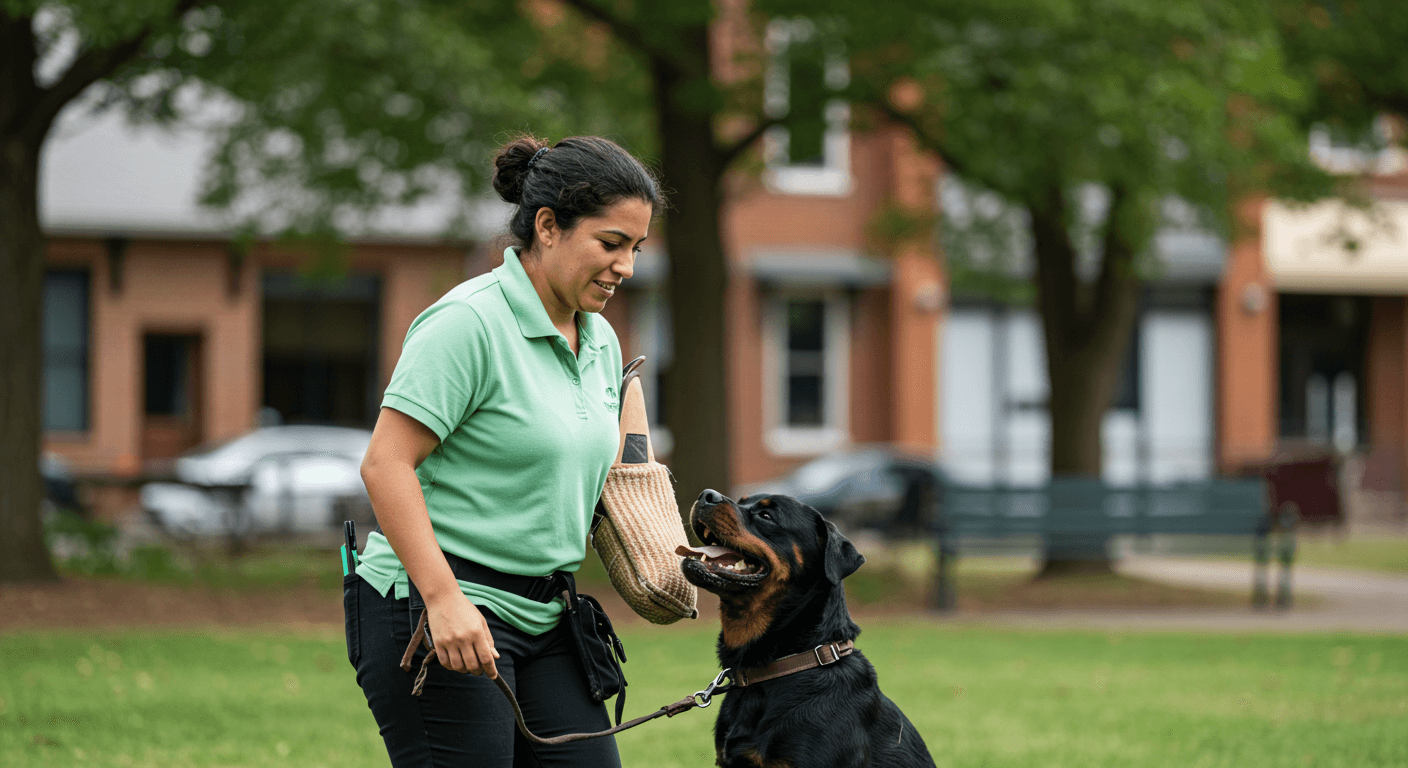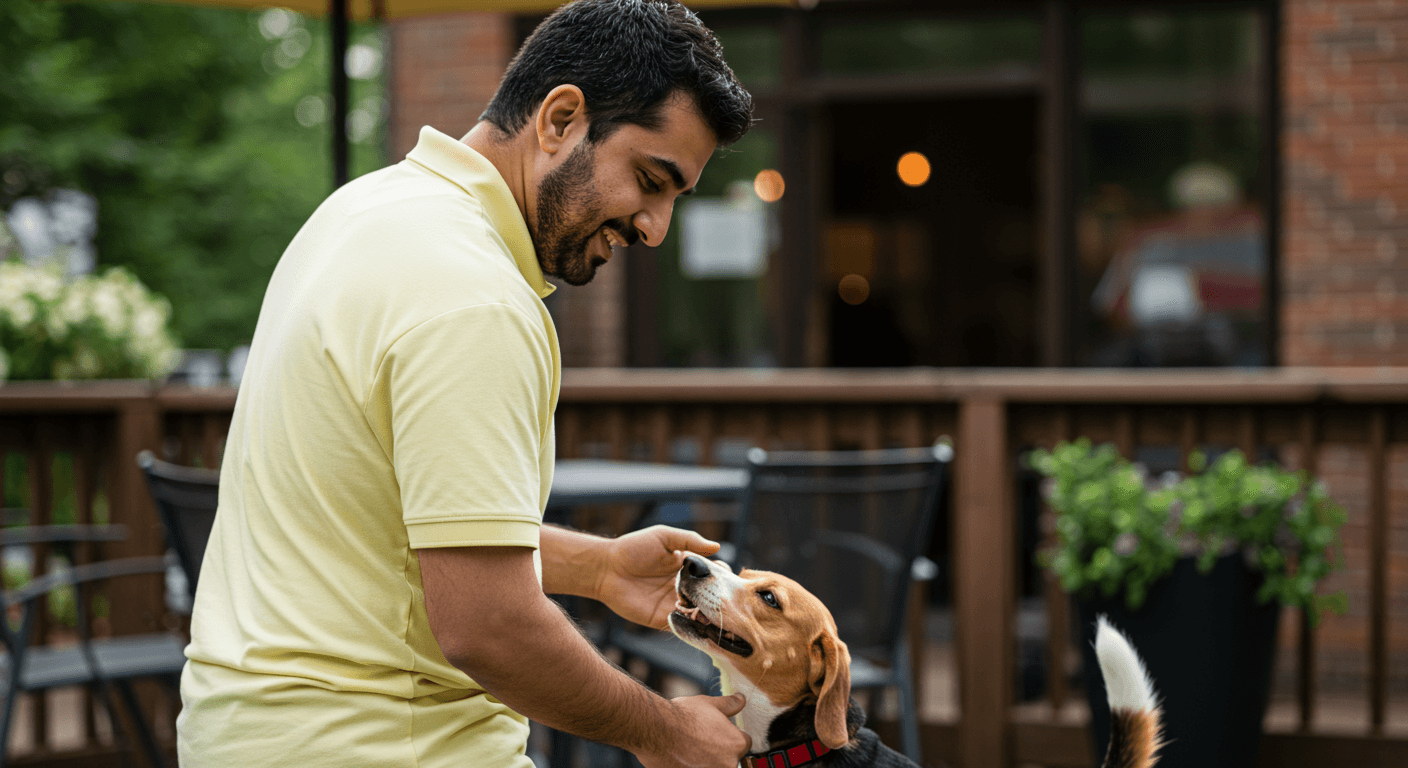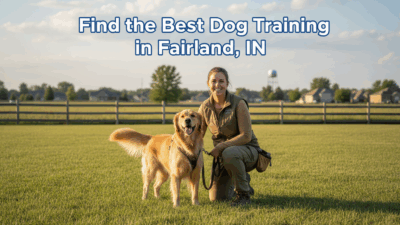Your Complete Guide to Choosing a Dog Trainer in Fairland IN and Surrounding Areas
Living with a dog in Fairland means you’re part of a small, tight-knit Shelby County community where your neighbors know your dog’s name and where afternoon walks often lead to friendly conversations. Your dog needs to be comfortable with rural life, from staying calm during encounters with farm animals to maintaining good leash manners when you meet neighbors at the local post office.
Since Fairland is a small town, you’ll likely draw from trainers serving broader Shelby County or nearby areas like Shelbyville, Greensburg, and even parts of the Indianapolis metro area. Finding someone familiar with rural Indiana living makes a real difference when you’re working on real-world skills your dog actually needs.
How to Choose the Right Trainer
Start by looking for a professional dog trainer who uses positive reinforcement training and understands the specific challenges of small-town Indiana life. Your dog needs to handle everything from tractor noise and livestock to staying polite during farm supply runs and quiet evenings on the porch.
Credentials help you compare experience levels quickly. Common dog trainer certifications include KPA-CTP, CPDT-KA, or IAABC-CDBC for behavior problems. If your dog shows serious aggression or fear issues, look for someone with CBCC-KA or a structured program like CTC.
In-home dog training works especially well in rural settings because your trainer can address problems exactly where they happen, whether that’s jumping on guests at your front door, barking at passing tractors, or pulling toward livestock during walks. Group classes make more sense once your dog can focus around distractions, though you may need to travel to Shelbyville or beyond for those options.
When you’re evaluating a training program, ask about travel fees since many expert dog trainers charge extra for the drive to smaller communities. A free consultation gives you a chance to see if the trainer’s style fits your needs before you commit.
Common Dog Training Methods Explained

Reward-based methods create lasting behavior changes while building the trust and cooperation you want from a well-behaved dog. They also help you meet Indiana’s requirements for keeping dogs under control in public spaces.
Basic obedience covers sit, down, stay, place, recall, and leash training so your dog can handle walks, visits to the feed store, and trips to the vet without drama. These foundational skills matter even more in rural areas where unexpected encounters happen regularly.
Puppy training focuses on socialization, potty training, bite control, crate comfort, and early leash work. Starting young prevents bad habits from taking root and helps your puppy adjust to both quiet country life and occasional trips to busier areas.
Behavior modification addresses fear, reactivity, resource guarding, separation anxiety, and other challenges through careful desensitization and counterconditioning. For serious cases, look for trainers who coordinate with local veterinarians to rule out medical causes.
Private lessons and in-home sessions let you customize everything around your daily routines and your property’s unique layout. Day training can speed up results when you’re short on time, with the trainer working your dog during the day and teaching you how to maintain progress.
Group classes help your dog practice good manners around other dogs and people. The best dog training classes screen participants carefully, give dogs plenty of space, and teach calm behavior rather than just excitement.
Specialized options like service dog training or therapy dog training require extra structure, public-access skills, and a very clear step-by-step plan. Board and train programs keep your dog with the trainer for intensive work, though you’ll still need to practice what they learned once your dog comes home.
Stay away from trainers who rely on fear, intimidation, or pain to get results. Humane methods are safer for everyone, easier to maintain long-term, and better for your relationship with your dog.
Average Cost of Dog Training in Fairland IN and Surrounding Areas (Updated for 2025)
Prices in Shelby County and surrounding areas depend on the trainer’s experience, session length, location, and whether you’re booking dog training classes or private work. Trainers serving rural areas often charge travel fees. Here’s what most dog owners are paying in 2025.
| Service Type | Average Cost (Shelby County Area) |
|---|---|
| Puppy classes (4–6 weeks) | $140–$250 total |
| Group obedience classes (4–6 weeks) | $150–$280 total |
| Private lessons (60–90 min) | $100–$175 per session |
| In-home coaching packages (4–6 visits) | $400–$850 total |
| Day training (trainer works your dog) | $425–$900 per week |
| Behavior consult for reactivity/anxiety | $140–$225 |
| Board and train (2–4 weeks) | $1,800–$4,200 total |
You’ll probably pay extra for trainers traveling from Shelbyville, Greensburg, or Indianapolis to reach Fairland. Behavior modification for aggressive dog training or severe anxiety typically costs more than basic obedience work.
Make sure you understand what’s included in dog training services, how the trainer tracks progress, and what happens if you need to reschedule training sessions.
Questions to Ask a Potential Dog Trainer
- What training methods do you use, and how do you keep sessions positive and low-stress?
- What credentials do you have, like KPA-CTP or CPDT-KA? Do you keep up with continuing education such as CPDT-KSA?
- How will you customize the training plan for my dog’s needs and our rural Indiana lifestyle?
- Do you offer in-home visits, group classes, or day training, and which approach fits my goals best?
- How far do you travel, and do you charge extra for visits to Fairland?
- How will we measure my dog’s progress and know when to add more distractions?
- What are the total costs, including travel fees, and what’s your cancellation policy?
- Do you carry liability insurance, and can you show me proof?
- For behavior problems, will you work with my veterinarian if needed?
- What should I practice between our sessions to help your dog keep improving?
Local Fairland and Shelby County Rules and Considerations
Fairland and Shelby County enforce leash laws and nuisance rules to keep neighborhoods and public spaces safe. Indiana state law sets public health requirements too.
Dogs must be kept under control at all times in public areas. While Fairland doesn’t have a formal leash ordinance on the books, Shelby County expects owners to prevent their dogs from running at large or creating nuisances. Keep a standard 6-foot leash with you when you’re off your property.
Indiana law requires current rabies vaccination for all dogs over three months old. You can get these through county clinics or your regular vet, and you’ll find more details through the Indiana State Board of Animal Health.
Excessive barking can be considered a nuisance, so work with your trainer on alert barking and separation anxiety before neighbors start complaining. This matters even more in quiet rural areas where sound carries.
Indiana doesn’t require special licenses for dog trainers, but if a business boards dogs for payment, the state’s Board of Animal Health oversees facility licensing and inspections. Ask about liability insurance to protect both you and the trainer during training for dogs.
Shelby County Animal Control handles stray dogs, bite reports, and other animal welfare concerns. You can reach them through the county government offices in Shelbyville.
Local Fairland and Surrounding Area Resources for Dog Owners
These spots give you places to practice polite manners, work on recalls, and provide safe enrichment for your dog. Always follow posted rules and local etiquette guidelines.
- Blue River Memorial Park in Shelbyville offers open spaces where leashed dogs can practice focus around families, picnickers, and other distractions.
- Custer Howell Park in Greensburg provides walking paths and green spaces for leash training and building calm behavior around community activities.
- Atterbury Fish & Wildlife Area welcomes leashed dogs on trails and in designated areas, giving you excellent opportunities to practice recall and focus around wildlife.

FAQs
How much does in-home dog training cost?
Most trainers serving Fairland and Shelby County charge $100–$175 per in-home visit, with discounts available when you buy packages. Expect higher rates for behavior problems and additional travel fees for rural locations.
Is in-home dog training worth it?
Absolutely, especially in rural settings where you’re working on real-life challenges like barking at farm equipment, reacting to livestock, or pulling during walks on country roads. Your trainer can address problems exactly where they happen and help your dog generalize skills to different parts of your property.
Can you pay someone to house train your dog?
Yes, many trainers offer puppy training programs that include potty training, crate routines, and daily schedules. Day training can speed up the process while teaching you how to maintain the progress at home.
What is the 3-3-3 rule for dog training?
This is a helpful timeline for new or adopted dogs: expect about 3 days for your dog to decompress, 3 weeks to learn your routines, and 3 months to feel completely settled. Good training programs work with this natural adjustment period rather than pushing too hard too soon.
How long will it take to reach my training goals?
Most puppies and friendly adult dogs show solid progress within 4–8 weeks if you practice daily. Fear, reactivity, or aggressive behavior typically requires several months of careful behavior modification with gradual increases in difficulty and distractions.
What should I bring to group classes?
Pack a flat collar or harness, a 6-foot leash, high-value treats, water, and current vaccination records if your trainer requests them. Leave retractable leashes at home for safety reasons and better control.
What’s the leash law in Fairland?
While Fairland doesn’t have a specific municipal leash ordinance, Shelby County expects dogs to be under control and not running at large. Using a leash in public spaces protects your dog, respects your neighbors, and prevents conflicts with livestock or wildlife.
Do I need a dog license in Fairland or Shelby County?
Shelby County doesn’t require general pet licenses, but keep your dog’s rabies vaccination current and the tag on their collar. Contact Shelby County Animal Control for information about lost pets and other local resources.
What shots does my dog need in Shelby County or Indiana?
Rabies vaccination is required throughout Indiana for all dogs over three months old. Your veterinarian may also recommend distemper-parvo, bordetella, and leptospirosis based on your dog’s lifestyle and exposure risks. Check state guidelines through the Indiana State Board of Animal Health.
Are dog trainers required to be licensed in Fairland or Shelby County or Indiana?
No special trainer licenses exist in Indiana. Trainers follow normal business regulations, but if they offer board and train services, their facility may need to be licensed under the state’s Board of Animal Health regulations for animal boarding facilities.
Where can I practice off-leash recall?
Fairland doesn’t have a designated dog park, so you’ll need to travel to nearby communities or use safely fenced private property. Always get permission before using someone else’s land and make sure your dog has a solid recall before trying off-leash work.
Which dog parks allow training around Fairland?
Fairland doesn’t currently have a public dog park. The nearest fenced dog parks are typically found in larger communities like Shelbyville, Greensburg, or the Indianapolis metro area. Contact those parks directly to confirm rules about training sessions.
What trails allow dogs for training?
Atterbury Fish & Wildlife Area welcomes leashed dogs on trails and in designated areas. These trails are perfect for teaching calm focus around wildlife, other hikers, and natural distractions. Always keep your dog leashed and follow posted regulations to protect wildlife and other visitors.
How do I find the best dog trainer near Fairland?
Start by checking credentials, reading reviews, and asking about training methods during a free evaluation. Look for someone who uses positive reinforcement, understands rural Indiana living, and is willing to travel to your home for training sessions.
Can a certified dog trainer help with separation anxiety?
Yes, a qualified trainer with experience in behavior modification can help your dog through separation anxiety using desensitization and counterconditioning techniques. For severe cases, they may recommend working with your veterinarian to rule out medical issues or discuss medication options.
The right combination of thoughtful planning, humane methods, and consistent practice around Fairland and Shelby County will help your dog become a confident, well-mannered companion. Whether you’re working on puppy classes, dog obedience training, or more complex behavior challenges, choosing a trainer who understands your local area and uses science-based socialization techniques makes all the difference.
